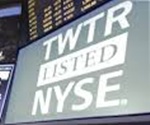Twitter soars to $45.1 on NYSE debut
08 Nov 2013
Micro-blogging network Twitter proved sceptics, who had raised the prospects of a replay of social network Facebook fiasco, wrong.
 On the first day of trading Twitter's market value soared to $24.5 billion.
On the first day of trading Twitter's market value soared to $24.5 billion.
Shares in Twitter opened at $45.10 on the New York Stock Exchange and rose to as high as $50.09, sending the company's market capitalisation above the $27 billion-mark for a brief spell. The company ended the day at $44.90 a share, which gave the loss-making business a valuation higher than corporations such as BSkyB, Sainsbury's and BAE Systems.
More importantly, the figure was also around 73 per cent higher than the $14.2-billion price tag that the company had worked out of itself on Wednesday evening, when the eight-year-old business priced its initial public offer at $26 a share.
However, the company did not open for trading for over an hour of the exchange opening, as NYSE took time to calculate the exact opening price for Twitter shares.
The delay revived memories of the blackout that hit rival Nasdaq during Facebook's market debut (See: Nasdaq agrees to pay $10 million for Facebook IPO glitch).
Twitter's initial rise also paralleled Facebook's debut, which was placed at $38-a-share when it went public in May 2012 and traded as high as $44.50 before returning to just above opening price.
The social network plunged in the following months, to as low as $17.55, in a turn that shocked the investing public (See: Facebook shares down nearly 18 per cent below IPO price).
Over 13 million Twitter shares were traded with their availability an hour after the opening of the New York Stock Exchange. The IPO comes as the largest from a technology company after Facebook's in 2012.
Contrary to the general trend of technology companies opting for a Nasdaq float, Twitter filed its IPO on the NYSE, which decorated its exterior with banners promoting the offer yesterday.
Twitter, with over 230 million users, is yet to make a profit.
Traders at the New York Stock Exchange had expected Twitter to choose the technology-heavy Nasdaq exchange for its floatation.
According to commentators, most technology firms of the type do not have profits and their business models are not tested, which makes profit prediction - and thus, valuation in the form of share price - hard for underwriting banks like Morgan Stanley and Goldman Sachs.
If shares had been priced too high, there was the risk of turning off investors, whereas with low pricing there was the risk leaving money on the table and turning away long-term investors, who might not like volatility.
Tech companies generally tend to post bigger first-day jumps than the overall market. However, first day "pops", as these have come to be known are a common occurrence with the first wave of social media companies going public.
LinkedIn's shares jumped 84 per cent in their first few minutes of trading in 2011, while online radio Pandora shot 60 per cent, and deal coupon site Groupon was up 34 per cent at the time of debut.



















